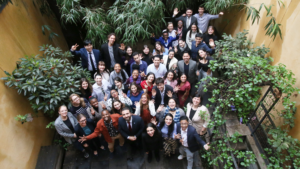 Elie Wiesel, a survivor of the Holocaust, a writer, and a Nobel Peace Prize laureate, was a witness and victim of one of most heinous crimes committed in recent memory. The Holocaust and the other atrocities committed under the Nazi regime were based both on a distorted notion of the person and utter hatred. However, Wiesel noted that throughout his time in the concentration camp and the years following his liberation, it was not the hatred of the perpetrators which had the most detrimental effect on his spirit, but rather the indifference of the bystanders; the silence of the good men and women. Wiesel presents a thought provoking statement in his speech “The Perils of Indifference”:
Elie Wiesel, a survivor of the Holocaust, a writer, and a Nobel Peace Prize laureate, was a witness and victim of one of most heinous crimes committed in recent memory. The Holocaust and the other atrocities committed under the Nazi regime were based both on a distorted notion of the person and utter hatred. However, Wiesel noted that throughout his time in the concentration camp and the years following his liberation, it was not the hatred of the perpetrators which had the most detrimental effect on his spirit, but rather the indifference of the bystanders; the silence of the good men and women. Wiesel presents a thought provoking statement in his speech “The Perils of Indifference”:
Of course, indifference can be tempting — more than that, seductive. It is so much easier to look away from victims. It is so much easier to avoid such rude interruptions to our work, our dreams, our hopes. It is, after all, awkward, troublesome, to be involved in another person’s pain and despair. Yet, for the person who is indifferent, his or her neighbor are of no consequence. And, therefore, their lives are meaningless. Their hidden or even visible anguish is of no interest. Indifference reduces the other to an abstraction.
Indifference distorts a person’s perception of others and the dignity that each person possesses. The indifferent person detaches himself from his neighbor; he rejects his natural empathy and seeks only that which is in his best interest. As Weisel says, it seeks comfort over love. As hatred is a passion, it in return can elicit another passionate response: Love. However, indifference lacks any passion and is stagnant and lifeless, therefore it needs to completely change its composition to bear love.
Indifference is not an issue of the past and it manifests itself in various ways in modern society. The indifferent person today cares nothing about the refugee or migrant who flees their home due to political, economic, religious or ethnic persecution and hardships. The indifferent person completely ignores the homeless person sleeping on the street and is not moved by compassion. One of the most prevalent forms of indifference has emerged through the rise of technology and the birth of the “Smart” phone. It is common to see a family or group of friends sitting in a restaurant, mesmerized by their screens and completely oblivious of their current state and location. These people are not ignoring their loved ones out of hatred or despisement; it is indifference. Indifference has filled a void that has been created by the rejection of sacrificial love and gift of self. This denial of one’s own comfort, security, and dreams is the only way in which indifference can be combated.
In reality, indifference is weak and pathetic, yet invasive and blinding. There are several steps which can be taken to destroy it. The first is self-awareness. Every person is indifferent in one way or another, and they cannot defeat it unless they recognize it and are aware of it. Next, a person must learn to grow in relation to others and to see others as human beings with dignity and value. Lastly, a person must learn to feel deeply and think critically, guiding the heart with the head and directing his focus away from himself and towards others.
One of the greatest modern poets, T. S. Eliot, was also a critic of modern life. In his poem, “The Hollow Men,” he criticizes people who live for nothing in their life and who reject morality so they can live a life focused on themselves. Eliot believes that these people lead a meaningless life. The last line of his poem contains a warning that the destruction of humanity will eventually be a result of weakness rather than by an excess of passion. He writes,
This is the way the world ends
Not with a bang but a whimper.
The haunting words of Eliot are a reminder of both the weakness of indifference and yet the destructive capabilities and despair it contains. To see the value and dignity in another, one must learn to love. To love another person is certainly difficult and a continual struggle. Paradoxically this struggle of love is also life-giving and renewing.
Written by Patrick Conant, a current intern at the WYA North America office.







